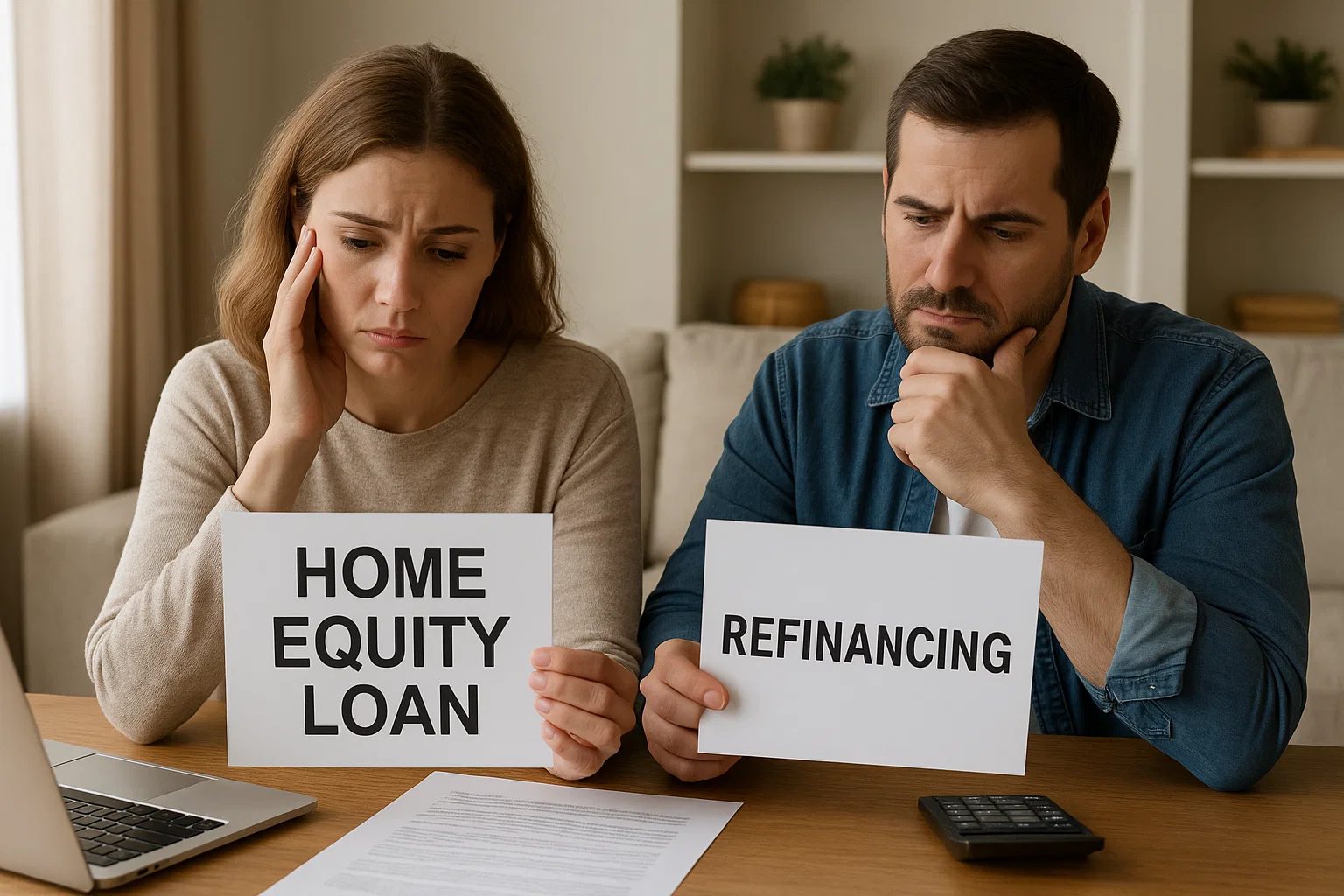Home Equity Loan vs Refinance: Which Option Is Right for Your Finances?
November 19, 2025
A home equity loan is a second mortgage with a lump sum and fixed interest, while a cash-out refinance replaces your original mortgage with a larger one. Choose based on your cash needs, interest rates, and whether you want to keep your original mortgage terms.

Trying to figure out how to get some cash from your house? It can be a bit confusing. You've probably heard about a home equity loan or refinance, but which one is right for your money situation? Both let you use your home's value, but they work in different ways. Let's break down the main points of each so you can make a good choice.
Key Takeaways
• A cash-out refinance pays off your old mortgage and gives you a new one, often with a different interest rate.
• A home equity loan is a separate loan that uses your home's value as security. It's like a second mortgage.
• If you plan to stay in your home for a while and can get a lower interest rate, a cash-out refinance might be good.
• Home equity loans are great if you need a specific amount of money for a project, like home improvements.
• Both options let you get cash from your home's value, but they have different terms and interest rates.
Understanding Home Equity Loan vs Refinance
Key Differences Between Loan Types
Okay, so you're thinking about tapping into your home's value, right? Two common ways to do that are home equity loans and cash-out refinances, but they work pretty differently. A cash-out refinance replaces your current mortgage with a new, bigger one, while a home equity loan is essentially a second mortgage you take out in addition to your existing one. With a refinance, you're aiming for potentially better interest rates or loan terms overall. With a home equity loan, you keep your original mortgage as is and just add another payment to the mix. One isn't necessarily better than the other; it really depends on your situation.
Similarities in Home-Secured Lending
Even though they operate differently, home equity loans and cash-out refinances do share some common ground. For starters, both use your home as collateral. This means the lender could foreclose if you fail to make payments. Also, lenders usually won't let you borrow the full amount of your home's equity. They'll want you to keep some equity in the house. Finally, both options require an appraisal to determine the current market value of your home. This helps the lender assess the risk involved in lending you money.
Overview of Cash-Out Refinance and Home Equity Loans
Let’s break down each option a bit more. A cash-out refinance involves taking out a new mortgage that's larger than your current one. You use the extra cash for whatever you need – home improvements, debt consolidation, or even a vacation. The old mortgage gets paid off, and you're left with a single, new loan. A home equity loan, on the other hand, is a separate loan that uses your home equity as collateral. You receive the loan amount as a lump sum and make fixed monthly payments until it's paid off. It's like having two mortgages at the same time.
Choosing between these two options really boils down to your financial goals, your risk tolerance, and how you want to manage your debt. Consider your current mortgage rate, how much cash you need, and your long-term financial plans before making a decision.
When a Home Equity Loan Makes Sense
Ideal Scenarios for Home Equity Loans
Home equity loans can be a solid choice when you need a lump sum of cash for a specific purpose. Unlike a cash-out refinance, a home equity loan leaves your existing mortgage untouched. This is particularly useful if you have a low interest rate on your current mortgage that you don't want to lose. Think of it as borrowing against the equity you've built in your home without messing with your primary mortgage.
Maintaining Your Current Mortgage Rate
One of the biggest advantages of a home equity loan is the ability to keep your existing mortgage intact. If interest rates have risen since you took out your original mortgage, refinancing could mean a higher rate. A home equity loan allows you to access cash without sacrificing that favorable rate. It's like having your cake and eating it too, especially if you're happy with your current mortgage terms.
Fixed Payments and Predictable Budgeting
Home equity loans typically come with fixed interest rates and fixed repayment schedules. This makes budgeting much easier because you know exactly how much you'll be paying each month. This predictability can be a major advantage over options like HELOCs (Home Equity Lines of Credit), where interest rates can fluctuate. With a home equity loan, you get a lump sum upfront and a clear repayment plan. This can be especially helpful if you're using the funds for a specific project, like a home renovation, and want to avoid the uncertainty of variable rates.
When a Cash-Out Refinance Makes Sense
Leveraging Increased Home Value
If your home's value has significantly increased since you bought it, a cash-out refinance can be a smart move. It allows you to tap into that increased equity and get cash in hand. Basically, you're borrowing against the new, higher value of your home. This can be especially useful if you need a large sum of money for a major expense.
Lower Interest Rates for Larger Expenses
Cash-out refinancing can be a good option when you're facing big expenses and want a potentially lower interest rate than you'd get with other types of loans. For example, if you're planning a major home renovation or need to cover hefty medical bills, the interest rate on a cash-out refinance might be more favorable than a personal loan or credit card. This can save you money in the long run, even with the added closing costs.
Consolidating Debt with a New Mortgage
One popular use for cash-out refinancing is debt consolidation. If you have multiple high-interest debts, like credit card balances or personal loans, you can roll them into a new, larger mortgage. This simplifies your finances by turning several payments into one, and you might also secure a lower overall interest rate. Just remember, while consolidating debt can be helpful, it's important to address the underlying spending habits that led to the debt in the first place. Otherwise, you might find yourself back in the same situation down the road.
Financial Implications of Each Option

Interest Rate Considerations
Interest rates are a big deal. With a home equity loan, you're often looking at a fixed interest rate, which means your payments will be predictable. However, these rates can sometimes be higher than those for a cash-out refinance, especially if the overall interest rate environment is favourable. Cash-out refinances, on the other hand, give you the chance to potentially snag a lower interest rate on your entire mortgage, but remember, you're also refinancing the existing amount, not just the extra cash you're taking out.
Closing Costs and Associated Fees
Don't forget about the fees! Both home equity loans and cash-out refinances come with closing costs. These can include appraisal fees, title insurance, origination fees, and other charges. Closing costs can add up quickly, so it's important to get a detailed estimate of all the expenses involved before making a decision. With a home equity loan, the closing costs are generally lower than a full refinance. Refinancing involves more paperwork and processes, which translates to higher costs.
Impact on Your Existing Mortgage
With a home equity loan, your existing mortgage stays exactly as it is. You're just adding another loan on top of it. This means you'll have two separate monthly payments to manage. A cash-out refinance, however, replaces your existing mortgage with a new, larger one. This can simplify your monthly payments, but it also means you're starting over with a new loan term, which could mean paying more interest over the life of the loan. It's a good idea to sit down and do the math. Figure out the total cost of each option, including interest and fees, over the entire loan term. This will give you a clearer picture of which one is the better financial choice for you.
Assessing Your Financial Goals

Short-Term vs. Long-Term Needs
Are you looking for a quick fix, or are you planning for the future? A home equity loan might be great for immediate needs, like a new roof. But if you're thinking about long-term investments or major life changes, a cash-out refinance could be a better fit. Consider how each option aligns with your overall financial timeline.
Here's a simple way to think about it:
- Short-Term: Home repairs, unexpected expenses, smaller investments.
- Long-Term: Debt consolidation, major renovations, long-term investments.
- Ongoing: Managing monthly cash flow, reducing overall interest payments.
Debt Consolidation Strategies
Debt consolidation is a common reason people consider these options. If you're drowning in high-interest debt, like credit card balances, both a home equity loan and a cash-out refinance can offer a way out. However, the best approach depends on the amount of debt and your ability to manage payments.
- Home Equity Loan: Good for consolidating smaller debts while keeping your existing mortgage intact.
- Cash-Out Refinance: Better for consolidating larger debts, potentially at a lower interest rate (if rates are favorable).
- Balance Transfer: Consider this option for credit card debt if you can qualify for a 0% introductory rate.
Funding Home Improvements and Major Purchases
Planning a kitchen remodel or finally buying that boat? Both options can provide the funds you need. But think about the scale of the project and how it will impact your home's value. A cash-out refinance might make sense for a major renovation that increases your home's worth, while a home equity loan could be sufficient for smaller projects. It's important to remember that borrowing against your home is a serious decision. Make sure you have a solid plan for repayment, and don't overextend yourself. Consider the long-term implications before making a choice.
Risks and Considerations for Homeowners
Understanding Foreclosure Risks
One of the biggest risks with both home equity loans and cash-out refinances is the potential for foreclosure. Since your home secures the loan, failing to keep up with payments can lead to the bank taking possession of your property. It's a scary thought, but it's important to understand the stakes. Make sure you have a solid plan for repayment before committing to either option. Consider the home equity loans benefits but also the risks.
Impact on Your Credit Score
Both home equity loans and cash-out refinances can affect your credit score, though in different ways. Taking out a new loan or increasing your overall debt can temporarily lower your score. However, making timely payments can improve it over time. Missed payments, on the other hand, will have a negative impact. It's a balancing act, and responsible borrowing is key.
Evaluating Your Repayment Capacity
Before you jump into either a home equity loan or a cash-out refinance, take a hard look at your finances. Can you realistically afford the monthly payments? Consider your income, expenses, and any other debts you have. Don't overextend yourself. It's better to borrow less than you think you need than to struggle with repayments down the road. It's easy to get caught up in the excitement of having access to extra funds, but it's crucial to be honest with yourself about your ability to repay the loan. Defaulting on a home equity loan or refinance can have serious consequences, including damage to your credit score and the loss of your home.
Here are some questions to ask yourself:
- What's my current debt-to-income ratio?
- How stable is my income?
- What are my essential monthly expenses?
- Do I have an emergency fund to cover unexpected costs?
Loan Terms and Amortisation
New Mortgage Terms with Refinancing
When you opt for a cash-out refinance, you're essentially replacing your existing mortgage with a new one. This means new loan terms, including the interest rate, loan duration, and monthly payment amount. The length of the new mortgage can significantly impact your monthly payments and the total interest you'll pay over the life of the loan. For example, choosing a 30-year mortgage will lower your monthly payments but increase the total interest paid, while a 15-year mortgage will do the opposite. It's a balancing act.
Separate Payment Schedules for Home Equity Loans
Home equity loans, on the other hand, operate differently. They exist alongside your current mortgage, creating a second loan with its own distinct payment schedule. This means you'll have two separate monthly payments to manage: one for your original mortgage and another for the home equity loan. The terms of the home equity loan, including the interest rate and repayment period, will be determined independently of your first mortgage. This can be beneficial if you want to keep your existing mortgage terms intact, but it also requires careful budgeting to handle the additional monthly expense. A home equity line of credit is usually taken out in addition to your existing first mortgage.
Understanding Loan-to-Value Ratios
Loan-to-value (LTV) ratio is a critical factor in both home equity loans and cash-out refinances. LTV represents the amount you're borrowing compared to the appraised value of your home. Lenders use LTV to assess the risk associated with the loan. A lower LTV (meaning you have more equity in your home) typically translates to better interest rates and loan terms. Most lenders have maximum LTV thresholds for both types of loans. For example, they might allow a maximum LTV of 80% for a home equity loan or a cash-out refinance. Understanding your home's current value and the lender's LTV requirements is essential for determining how much you can borrow.
It's important to remember that borrowing against your home equity increases your risk of foreclosure if you're unable to make payments. Carefully evaluate your financial situation and repayment capacity before taking on either a home equity loan or a cash-out refinance.
Wrapping Things Up
So, when you're trying to figure out if a home equity loan or a refinance is better for you, it really comes down to your own situation. Think about what you need the money for, how much you need, and what kind of interest rates make sense for you. Both options let you use the value you've built up in your home, but they work in different ways. It's a good idea to talk to a financial expert, someone who can look at your specific numbers and help you pick the path that fits your goals best. Don't rush into it; take your time and make a smart choice for your money.
Frequently Asked Questions
- Can you refinance your home equity loan?
Yes, you can refinance your home equity loan. This can be a smart move if interest rates have dropped since you first got the loan, or if you want to switch from a loan with changing interest rates to one with a steady rate. - Is a home equity loan cheaper than a refinance?
Home equity loans usually have much lower upfront fees than cash-out refinances. Sometimes, the lender might even cover these fees for you. Even though home equity loans often have higher interest rates, they might be a better choice than a cash-out refinance if their rates are similar to your current mortgage rate, especially if you're only borrowing a small amount. - What are the alternatives to a HELOC or cash-out refinance?
If you're thinking about getting money for a small project or to pay off a small debt, a personal loan or a credit card with a low interest rate might be your best bet. With these options, you avoid the closing costs that come with cash-out refinances and home equity loans, and your home isn't at risk if you can't make the payments. - Will I lose my home equity when I refinance?
Simply put, no. You won't lose the value you've built up in your home when you refinance. - What's the main difference between a home equity loan and a cash-out refinance?
A home equity loan is like a second mortgage, meaning you have two loans on your home. A cash-out refinance replaces your original mortgage with a new, larger one. - How do I decide which option is right for me?
The best choice depends on your personal situation. If you have a low interest rate on your current mortgage and only need a set amount of money, a home equity loan might be good. If you want to get a lower interest rate on your main mortgage and also need a large sum of cash, a cash-out refinance could be better.

Alex Chen

Alex Chen













Get in touch with a loan officer
Our dedicated loan officers are here to guide you through every step of the home buying process, ensuring you find the perfect mortgage solution tailored to your needs.
Options
Exercising Options
Selling
Quarterly estimates
Loans
New home

随时了解有见地的文章和指南。
每周一,你将获得一篇文章或指南,这将帮助你在工作和个人生活中更具活力、更专注和更有成效。





.png)
.png)
.png)
.png)
.png)
.png)
.png)
.png)
.png)
.png)
.png)
.png)
.png)
.png)
.png)
.png)
.png)
.png)
.png)
.png)
.png)
.png)